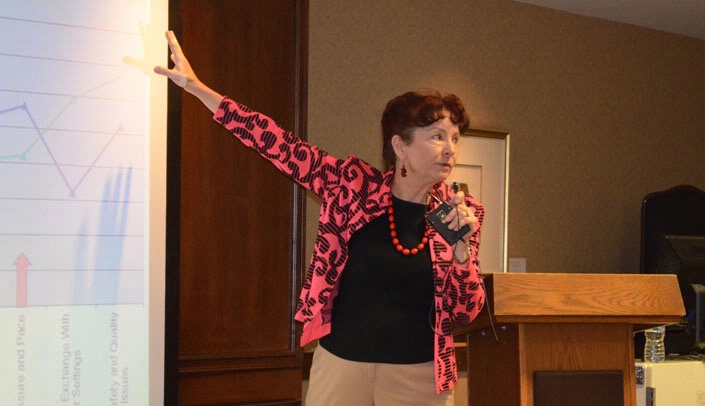For Patti Carstens, program manager of the Clinical Skills Lab, it was an opportunity to learn more about a special program that could be applied to her work with simulation.
Carstens joined representatives from 14 Nebraska Medicine ambulatory clinics to participate in the two-day “train the trainer” workshop on the UNMC campus last month.
Participants learned about the TeamSTEPPS program (Team Strategies and Tools to Enhance Performance and Patient Safety), which is directed by Katherine Jones, Ph.D., associate professor, physical therapy education, in the College of Allied Health Professions.
What is TeamSTEPPS?
TeamSTEPPS is an evidence-based curriculum developed by the Department of Defense’s Patient Safety Program in collaboration with the Agency for Healthcare Research and Quality. Key components include team structure, leadership, situation monitoring, mutual support and communication.
“We have leveraged our experience teaching TeamSTEPPS to support the growing demand for interprofessional experiences across disciplines,” said Katherine Jones, Ph.D., of the UNMC College of Allied Health Professions.
If you are interested in learning more about TeamSTEPPS, contact Dr. Jones.
“I am hoping to put TeamSTEPPS communication strategies into my work with my fellow staff members, and then I hope to put some TeamSTEPPS tools into the simulations themselves working with students,” Carstens said. “We struggle with integrating team training into simulation, and what TeamSTEPPS does is gives us a common language to be able to communicate across disciplines.”
Dr. Jones led the workshop supported by her patient safety team members, Russ Buzalko, Ph.D., emergency medicine; Victoria Kennel, Ph.D., allied health research administration; Anne Skinner, allied health research administration; and John Crowe, a graduate research assistant. The “train-the-trainer” workshop drew 57 participants from clinics that included Village Pointe, Plattsmouth, Oak View, Midtown, Olson Center, Brentwood and Bellevue, among others.
The reason for the turnout, Dr. Jones said, was the leadership of Joyce Miller-Andersen, practice transformation advisor in ambulatory care administration for Nebraska Medicine. Miller-Andersen is leading the implementation of the medical home model of care in ambulatory clinics.
“Nebraska Medicine’s primary care clinics’ mission is to partner with patients, families and the community to promote healthy outcomes,” Dr. Jones said. “Their vision includes providing patient-centered care in a medical home, which requires a team-based approach. The team may include providers, nurses, schedulers, medical assistants, pharmacists, case managers, social workers, and nutritionists. So that was the rationale for the training — to provide team skills to clinic leaders so that they can role model and teach these skills within their clinics.”
Jane Potter, M.D., professor of internal medicine-geriatrics, spoke at the event about the advantages of TeamSTEPPS.
“Dr. Potter has really pioneered the use of team skills to support patient-centered care in her ambulatory care clinic,” Dr. Jones said. She pointed out that on Dr. Potter’s business card, she lists other members of her team.
“So the patient knows that, if they are not seeing Dr. Potter, they are seeing a member of her team.
“Dr. Potter is very effective at introducing the idea that, from the beginning of her career as a geriatrician, she’s worked in teams. And she always wondered why one team would work together well and another wouldn’t,” Dr. Jones said. “When she was exposed to the TeamSTEPPS training, she understood: This team works together well because leaders are calling briefs, huddles and debriefs; this team works together well because a nurse or medical assistant feels free to speak up and voice a concern.”
